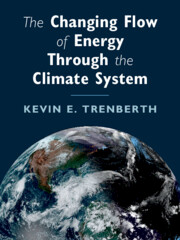Book contents
- The Changing Flow of Energy through the Climate System
- The Changing Flow of Energy through the Climate System
- Copyright page
- Contents
- Foreword
- Preface
- Acknowledgments
- 1 Earth and Climate System
- 2 Earth’s Energy Imbalance and Climate Change
- 3 Earth’s Energy Balance
- 4 The Sun–Earth System
- 5 Observations of Temperature, Moisture, Precipitation, and Radiation
- 6 The Climate System
- Flows of Energy
- Glossary
- Acronyms
- Bibliography
- Index
- References
3 - Earth’s Energy Balance
Published online by Cambridge University Press: 25 February 2022
- The Changing Flow of Energy through the Climate System
- The Changing Flow of Energy through the Climate System
- Copyright page
- Contents
- Foreword
- Preface
- Acknowledgments
- 1 Earth and Climate System
- 2 Earth’s Energy Imbalance and Climate Change
- 3 Earth’s Energy Balance
- 4 The Sun–Earth System
- 5 Observations of Temperature, Moisture, Precipitation, and Radiation
- 6 The Climate System
- Flows of Energy
- Glossary
- Acronyms
- Bibliography
- Index
- References
Summary
The incoming energy to the Earth system is in the form of solar radiation and roughly corresponds to that of a black body at the temperature of the Sun of about 6000 K. The Sun’s emissions peak at a wavelength of about 0.6 μm and much of this energy is in the visible part of the electromagnetic spectrum although some extends beyond the red into the infrared and some extends beyond the violet into the ultraviolet (Fig. 4.5). As noted earlier, because of the very nearly spherical shape of Earth, at any time half of Earth is in night (Fig. 1.2) and the average amount of energy incident on a level surface outside the atmosphere is one-quarter of the total solar irradiance, or 340 W m−2. About 30% of this energy is scattered or reflected back to space by air molecules, tiny airborne particles (known as aerosols), clouds in the atmosphere, or by Earth’s surface, which leaves about 240 W m−2 on average to warm Earth’s surface and atmosphere (Fig. 3.1).
- Type
- Chapter
- Information
- The Changing Flow of Energy Through the Climate System , pp. 25 - 33Publisher: Cambridge University PressPrint publication year: 2022

